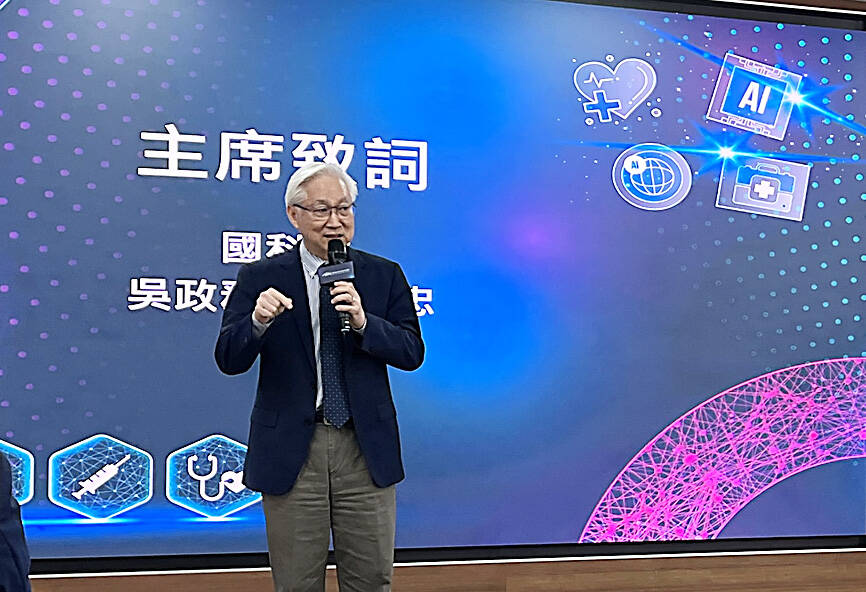Taiwan is planning a 10-year initiative aimed at increasing its global IC design market share to 40 percent by 2033, including an 80 percent share of the advanced semiconductor sector.
The National Science and Technology Council (NSTC), which put together the plan, is hoping to launch it next year, but it still has to be reviewed and approved by the Executive Yuan and have its budget approved by the Legislative Yuan.
NSTC Minister Wu Tsung-tsong (吳政忠) told a news conference on Tuesday that the project would aim to establish Taiwan as a pivotal hub for IC design.

Photo: Chen Chia-yi, Taipei Times
The project’s first phase, to last five years, would focus on creating semiconductor centers, developing talent and establishing infrastructure at the Industrial Technology Research Institute, Wu said.
The second phase would be aimed at helping Taiwan reach an IC design global market share of about 40 percent by 2033 and achieving an 80 percent global market share for advanced semiconductors of 7-nanometers or below, he said.
The long-term plan is aimed at extending semiconductor chip development, including to enhance medical precision, reduce costs, and shorten IC and semiconductor production time, Wu said.
Under the plan, Taiwan also hopes to cement its leading position in the semiconductor industry and lay the groundwork for the nation’s development by integrating chip technology and generative artificial intelligence, the NSTC said.
If the plan becomes a reality, the NSTC said it would seek a budget of NT$12 billion (US$376.23 million) in its first year.
It did not provide an estimate of how much it would cost over the plan’s full 10 years.

PROTECTION: The investigation, which takes aim at exporters such as Canada, Germany and Brazil, came days after Trump unveiled tariff hikes on steel and aluminum products US President Donald Trump on Saturday ordered a probe into potential tariffs on lumber imports — a move threatening to stoke trade tensions — while also pushing for a domestic supply boost. Trump signed an executive order instructing US Secretary of Commerce Howard Lutnick to begin an investigation “to determine the effects on the national security of imports of timber, lumber and their derivative products.” The study might result in new tariffs being imposed, which would pile on top of existing levies. The investigation takes aim at exporters like Canada, Germany and Brazil, with White House officials earlier accusing these economies of

Teleperformance SE, the largest call-center operator in the world, is rolling out an artificial intelligence (AI) system that softens English-speaking Indian workers’ accents in real time in a move the company claims would make them more understandable. The technology, called accent translation, coupled with background noise cancelation, is being deployed in call centers in India, where workers provide customer support to some of Teleperformance’s international clients. The company provides outsourced customer support and content moderation to global companies including Apple Inc, ByteDance Ltd’s (字節跳動) TikTok and Samsung Electronics Co Ltd. “When you have an Indian agent on the line, sometimes it’s hard

‘SACRED MOUNTAIN’: The chipmaker can form joint ventures abroad, except in China, but like other firms, it needs government approval for large investments Taiwan Semiconductor Manufacturing Co (TSMC, 台積電) needs government permission for any overseas joint ventures (JVs), but there are no restrictions on making the most advanced chips overseas other than for China, Minister of Economic Affairs J.W. Kuo (郭智輝) said yesterday. US media have said that TSMC, the world’s largest contract chipmaker and a major supplier to companies such as Apple Inc and Nvidia Corp, has been in talks for a stake in Intel Corp. Neither company has confirmed the talks, but US President Donald Trump has accused Taiwan of taking away the US’ semiconductor business and said he wants the industry back

PROBE CONTINUES: Those accused falsely represented that the chips would not be transferred to a person other than the authorized end users, court papers said Singapore charged three men with fraud in a case local media have linked to the movement of Nvidia’s advanced chips from the city-state to Chinese artificial intelligence (AI) firm DeepSeek (深度求索). The US is investigating if DeepSeek, the Chinese company whose AI model’s performance rocked the tech world in January, has been using US chips that are not allowed to be shipped to China, Reuters reported earlier. The Singapore case is part of a broader police investigation of 22 individuals and companies suspected of false representation, amid concerns that organized AI chip smuggling to China has been tracked out of nations such